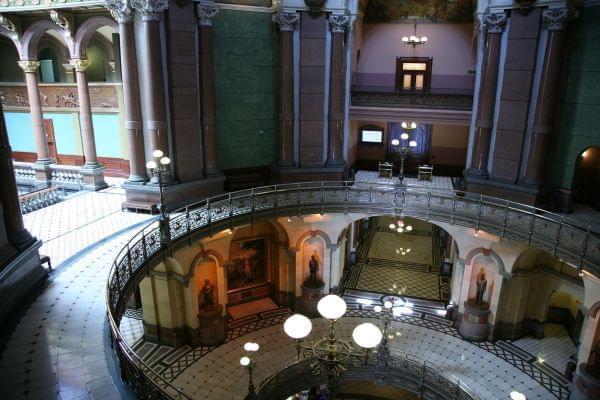Illinois’ Unconventional Budget-Making Methods (And The One That Seemingly Worked)

Illinois' new governor and the General Assembly's top Democrats and Republicans haven't all gotten together since the end of May. Daniel Schwen/Wikimedia Commons
Mark your calendars. A date has been set. Illinois Governor Bruce Rauner has called a meeting with the legislature's leaders to talk about the budget impasse for November 18.
He did it in response to a request from advocacy groups. It's the latest tactic as volunteers, lobbyists and lawmakers try to nudge the state's highest officials toward a deal.
It seems like it shouldn't be news, let alone a banner headline: The governor, and the leaders of the legislature, having a meeting.
Most people probably assume that's standard practice; and though there have been exceptions (say, during Rod Blagojevich's term), it has been in Illinois. Until this year: Illinois' new governor and the General Assembly's top Democrats and Republicans haven't all gotten together since the end of May.
Meaning, June, July, August, and September went by, without a so-called "leaders' meeting." The month isn't quite over yet, but it's safe to say you'll be ble to add October to that list too.
This, all as Illinois has gone without a budget, and all as many programs and agencies (think domestic violence shelters, drug abuse treatment centers, even the Lottery) have gone without state funding.
That's what prompted this Rep. Chad Hayes to say this last Tuesday, on the one day legislators were in session in October:
"I would like to renew my call for the doors to this building to be locked," the Danville-area Republican said. "I say, lock the doors. I say tell your family you're not going to be home. Next week or the week after that, or for Thanksgiving, or Christmas if necessary. Let's get the work of the people done!"
Members of the House heard his plea, then went on about their business as usual, without any acknowledgement of Hayes's proposal.
Needless to say, there was no legislative lock-in, and none is planned (and given parliamentary rules and laws, there are procedural roadblocks that could prevent it from happening anyway).
Special sessions of the legislature can rack up price tags of about $50,000 a day, with reimbursements and such. Senator Julie Morrison, a Democrat from Deerfield, has another idea.
"I'm not asking the General Assembly to meet. I'm asking four leaders, who were chosen from their colleagues, and the governor of the state of Illinois, to sit down together," she said.
She's more than asking, actually. Morrison has introduced a bill that would require it.
"It simply says that when there is no budget - no complete budget - when a fiscal year begins, that the four leaders and the governor must sit down in a room together, at least one hour a week, until that is resolved," she said.
One suggestion another legislator made last week: Rep. Sue Scherer, a Democrat from Decatur, encouraged her colleagues to coordinate their outfits, when the General Assembly is back in Springfield for a one day session next month.
"We all want the budget solved. This might be a small step in the right direction," she said. "I urge every single person in this body to please, acknowledge the seriousness of this, and show our unity, by please wearing black on November 10."
Given that the gridlock means Illinois is on the way to racking up what the comptroller estimates will be $8.5 billion more in bills than it has money to pay them, it may have been more fitting had she asked legislators to wear red.
The heads of six self-described "reform groups" had this state of pain in mind when they came together, to publicly call for a meeting among the Republican governor, the Democratic Senate President and House Speaker and the minority leaders of each chamber.
"We are ready to facilitate the logistics of a meeting in either Chicago, or Springfield," the letter they published in the Chicago Tribune read. "The consequences are too great. And we cannot let the situation continue. While leadership may not align on some core principles, we believe it is necessary for them to meet together, work through these issues and agree on a budget."
From all the ideas meant to spur action, this is the one that took.
On Friday, Gov. Rauner thanked the groups for the offer, said his office would take it from here and called the November 18 meeting. By then, Illinois will be well into its fifth month without a budget.
These high-level "leaders meetings" typically take place in secret; backroom deals and all that. Not this time.
Rauner's letter says the summit will be streamed-live online, and open to the press. So whatever the governor and the legislative leaders do -- or don't do -- at that long-awaited meeting, will be on full, public display.
Links
- Pressure Mounts For Lawmakers To End Budget Impasse
- Gov. Rauner, Democratic Leaders Negotiating November Meeting On Budget
- Provost: U of I Urbana Campus Coping With State Budget Impasse
- Rauner Wants Budget In 60-90 Days, Sees Chicago Fiscal Mess As Leverage Point
- Rauner: Budget Standoff ‘Could Go On For A While’
- Durbin Addresses State Budget Stalemate, Embassy In Cuba

